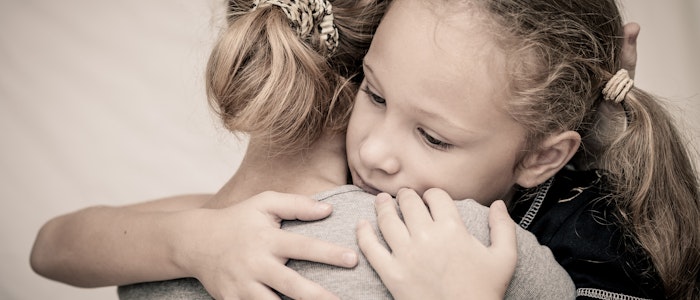


From the time my kiddo was little, my coming-home-from-work routine went something like this:
Mad dash from office to the apartment (when we lived in New York City) or house (after we moved to Boston). Mind racing with a bunch of work-stuff that I didn’t get to finish or that’s making me anxious (usually a mix of the two) on the way. Get home. Stand outside the front door or sit in my car in the garage long enough to put on my “everything is awesome” happy face. Walk in. Kiddo runs up. Get the best hug ever (every time it’s the best hug ever, right?).
When my daughter turned seven, the routine changed slightly. “How was your day?” she started asking me. “Great!” I’d lie, while three mom-commandments pounded inside my head:
- Work. Must. Stay. At. Work.
- Work. Stress. Must. Not. Leak. Into. Family. Time.
- Must. Shield. Child. From. All. Stress.
Because of course, as her mom, it was is my job to shield her from everything unpleasant... or so I believed, vehemently, for many years.
My conviction that as parents we were to shield our child from stress and difficulty likely had a lot to do with how I grew up. I’m the only child of two incredible humans who did everything in their power to shield me from the challenges we faced in the former Soviet Union. When my grandparents sent us fruit from the south of Russia to Leningrad (now St. Petersburg) -- a rarity in the winter -- my parents pretended they didn’t want to eat it so there would be more for me. While I knew about the anti-Semitism that my parents had encountered, I didn’t know that when I wasn’t allowed to travel with my dance troupe to Eastern Europe, it wasn’t to give the girl who was chosen instead of me a chance to go for the first time, as they’d told me, but because I was Jewish.
I don’t recall seeing either of them upset or stressed often, and my dad, ever the optimist, always encouraged us to find something positive to do or think about. Even during one of the lowest points of our journey to the U.S., while in a refugee settlement in Vienna, he came home one morning (after spending the night unloading fruit at the local market to make some extra money) and suggested we go see the Opera House: It was free and it was beautiful! When I told him that in our situation -- no documents! no money! uncertain future! -- it was absurd to go sightseeing, he said that even though life wasn’t great at that moment, sitting and wallowing would be stupid when we were in Vienna.
As I grew up -- in the projects outside Detroit after we first came here, and later in New Jersey -- and watched my parents rebuild their life here, I became more aware of the difficulties and stresses they faced. But I also absorbed the lesson of their protective behaviors, and by the time my husband and I had our daughter, I firmly believed that it was my maternal duty to shield my child from as much of the world’s unpleasantness as possible.
Clearly, many parents share this belief, going out of their way to make their kids’ lives richer with activities and experiences and travel, and protecting them from feeling stressed. An article in The Atlantic really brought this home to me when the author, a psychotherapist, described suddenly seeing many twenty and thirty year olds who came to her saying they just weren’t happy, despite their amazing parents and great childhoods. She slowly realized that what all these amazing parents had done was shield them from the stress of daily life -- leaving them unprepared to deal with it once they were on their own. What they called unhappy was just regular day-to-day living, filled with annoying commutes, jobs that don’t turn out to be as dreamy as they seem, difficult bosses, friends who call you less often than you’d like, and other stuff that fills our lives and adds to daily stress.
Two years ago, after over a decade of intensely stressful jobs, I started my own company -- one that’s founded in the science of wellbeing and devoted to helping people appreciate the small positive moments in their daily lives. I’ve never worked this hard, been this stressed, or attempted anything of this magnitude; I’m responsible for myself and my company, our employees, millions of dollars of investor capital we raised to get started, and hundreds of thousands of users who now rely on us to positively affect their lives. I love what I do, but being a CEO of a start-up has completely challenged all my stress-hiding tricks and strategies.
One day this past spring, I came home after a particularly horrible, no-good, very-bad day during which I got rejected by an investor, had an employee quit, and got stuck in crazy traffic which made me over an hour late. As I walked up the stairs from the garage, I did my best to put on my “everything is awesome” happy face like I always did, but this time it was all just too much. When my daughter ran up to hug me and asked me how my day was, the whole “hold the stress in” charade was up.
“My day was kind of awful, actually,” I said, surprising both of us with my honesty.
She looked up at my everything-is-not-awesome face, hugged me tighter, and asked me if I wanted some tea. When I said yes, we went into the kitchen, and I drank the tea she made for me while she did her homework, and we just... were. I didn’t try to be all cheery or cover up how I felt, and from time to time she either stroked my arm with her hand or just looked up to check on me.
“I’m sorry your day was bad, Mama,” she said eventually. “Sometimes, when I have a bad day, what I like to do is just read for a little bit or play something fun with you or Papa.”
I realized at that moment that I’d never really heard my daughter talk about having a bad day before. She would usually tell me school was great, dance was great, piano was great -- whatever I asked about was great. She was modeling me, and in my attempts to shelter her from my stress, I was teaching her to hide her own (just as I had done with my own parents).
That was the day I became a more honest mom.
While I don’t spill all my raw stress, anxiety and worry onto my daughter -- she’s only 10, and very much still a child, and part of our responsibility as her parents is yes, to create a positive, warm, nurturing environment at home -- I do talk to her about things that go wrong and things I’m worried about, giving her little pieces of reality to deal with and metabolize. And when I do, I remind myself that she looks up to me as her role model, so how I cope with life in general (and talk about juggling work and family in particular) will affect how she deals with those same issues in the future. My job isn’t to make her world perfect, it’s to teach her to be resilient in an imperfect world. Pretending that work is always great and that it never interferes with how I feel when I’m at home is just a lie -- and I became a much better mom as soon as I stopped telling it to my daughter.
Don't miss your happier boost!
Subscribe to our weekly email to get practical tips and inspiration to help you feel more joyful and resilient.


